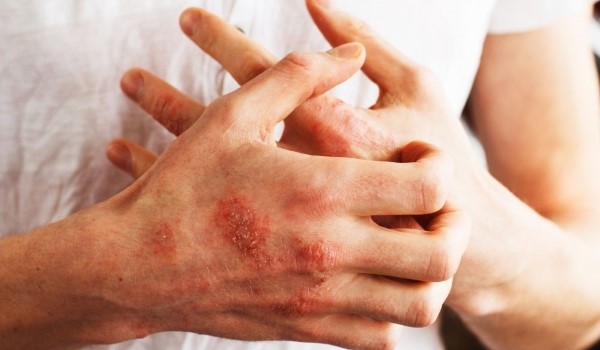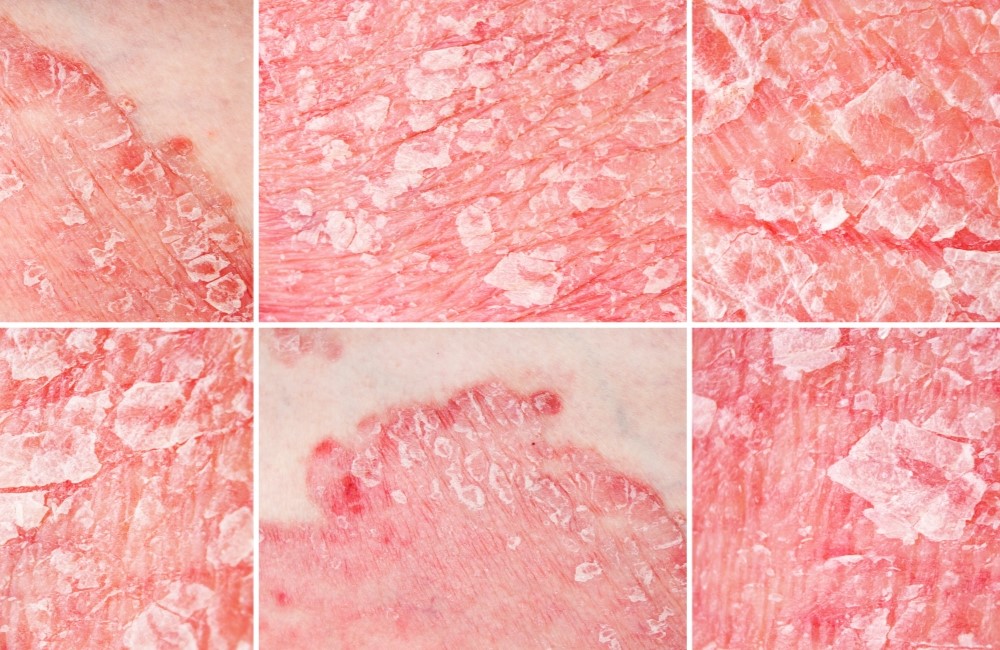What is a
Psoriasis?
Psoriasis is a chronic inflammatory skin disease that affects millions of people worldwide. With psoriasis, the skin cells renew themselves much faster than normal. Instead of a month, this process only takes a few days, causing excess skin cells to accumulate on the surface of the skin and form red, scaly, itchy plaques.
Psoriasis is neither contagious nor caused by a lack of hygiene. It is a complex disease in which genetic and environmental factors play a role.
About the symptoms
More information
Important facts about psoriasis
Symptoms and consequences of psoriasis:
- Raised, inflamed skin lesions with red skin, silvery-white scales and itching (plaque psoriasis)
- Small, drop-shaped lesions on the skin (guttate psoriasis)
- Reddish lesions in skin folds without scaling (inverse psoriasis)
- Pus-filled blisters on red skin (pustular psoriasis)
- Inflammation of the entire skin surface with severe, possibly painful, redness and scaling (erythrodermic psoriasis)
What accompanying symptoms can occur with psoriasis?
Nail psoriasis: nail changes such as dents, discoloration, brittle nails or thickening of the nail plate
Psoriatic arthritis: Inflammatory joint disease that can cause pain, stiffness, swelling and restricted movement
Psoriatic uveitis: inflammation of the inner skin of the eye, causing redness, sensitivity to light and blurred vision
Overweight and obesity are also frequently associated with psoriasis, as are metabolic disorders such as diabetes, high blood pressure and elevated cholesterol levels. Psoriasis is also associated with an increased risk of cardiovascular diseases such as heart attacks and strokes.
What causes psoriasis?
The causes of psoriasis are closely linked and influence each other. It is important to note that the exact causes of psoriasis are not yet fully understood and require further research.
Genetic predisposition
Genetic predisposition
Familial predisposition, certain gene variants (especially in connection with the immune system)
Immune system reaction
Immune system reaction
Incorrect activation of certain immune cells (especially T cells) causes an excessive inflammatory reaction
Environmental factors
Environmental factors
e.g. stress, smoking, certain medications, infections and injury to the skin
Inflammatory processes
Inflammatory processes
Accelerated renewal of skin cells and formation of plaques
What to do with psoriasis?
Appropriate skin care
Ensure regular and thorough skin care. It is important to maintain skin moisture and reduce flaking. Use mild, moisturizing skin care products and avoid irritating substances.
Optimization of lifestyle
A balanced diet, regular physical exercise and sufficient sleep can help to positively influence the course of the disease. Stress management techniques such as relaxation exercises or meditation can also be helpful. It often makes sense to seek professional support for this.
Medical measures
The treatment of psoriasis includes topical medication (creams, ointments), phototherapy (UV radiation), systemic medication (tablets, injections) to reduce inflammation and long-term care by a dermatologist to adapt treatment management. The choice of treatment depends on the severity of the disease and individual factors. In mild cases, for example, purely external treatment may be sufficient.
Sources
Please note that all content provided regarding individual medical conditions, treatments, procedures, etc. is general information and may vary depending on the physician:in and individual case and initial situation.
For more detailed information, please always consult your doctor.
Armstrong AW, Read C. Pathophysiology, Clinical Presentation, and Treatment of Psoriasis: A Review. JAMA 2020; 323(19): 1945-1960.
World Health Organization (WHO). Global report on psoriasis. 2016.
S3 guideline of the German Dermatological Society (DDG): Therapy of psoriasis vulgaris (status: 2021), at: www.awmf.org (accessed: 09.03.2022)
Deutscher Psoriasis Bund e.V.: Patient guideline for the treatment of psoriasis of the skin.
www.psoriasis-bund.de